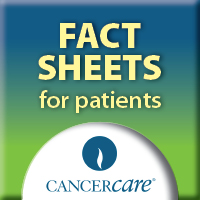The physical and emotional effects of cancer and treatment can be significant. The good news is that help is available from the different people who make up your health care team. It may seem obvious, but it is essential to remember that you are the most important member of your health care team. As with any type of health care you receive, you are a consumer of services, and you should not be afraid to ask questions about what you are getting and who is providing it.
Some of the health care professionals who work with people with cancer include:
Oncology social workers Oncology social workers are professionally trained to counsel people affected by cancer and help them access practical assistance. They can provide you with individual counseling, a support group, locate services in your community that help with home care or transportation, and guide you through the process of applying for Social Security Disability or other forms of assistance. CancerCare‘s oncology social workers are available to help you face-to-face, online or on the telephone, completely free.
Psychiatrists A psychiatrist is a medical doctor who specializes in helping people who are depressed and/or anxious. Because they are medical doctors, psychiatrists prescribe medication, such as antidepressants or medication to help you sleep.
Psychologists A psychologist is a professional who can assist you if you are feeling depressed, anxious, or sad about treatment side effects. While not medical doctors, psychologists have obtained a Ph.D. in psychology and many specialize in various forms of counseling.
Nurses Nurses have a wide range of skills and are usually in charge of implementing the plan of care your doctor has set up for you. They are trained to administer medication, monitor side effects and educate you on the medications you are receiving. Nurses are aware of support services in your community.
Home health aides Home health aides assist people who are ill and need help moving around, bathing, cooking, or doing household chores. Some state Medicaid programs will pay for home health aide care, provided they are supervised by a nurse. However, private insurance or managed care plans rarely pay for a home health aide.
Rehabilitation specialists Rehabilitation services help people recover from physical changes caused by cancer or cancer treatment. They include the services of physical therapists, occupational therapists, counselors, speech therapists, and other professionals who help you physically recover from cancer.
Nutritional services Cancer and cancer treatment may cause weight loss. For this reason, dietary or nutritional services are commonly prescribed for people with cancer. A nutritionist helps choose foods that provide enough calories, vitamins, and protein to help you feel better and control your weight, and gives you tips about increasing your appetite if you experience nausea, heartburn, or fatigue from your illness or treatment.
Clergy Prayer and spiritual counseling can be very important in coping with cancer. Many people find it useful to get help from clergy or other spiritual leaders, and there is no question that a strong sense of spirituality can help people face difficult challenges with courage and a sense of hope.
Hospice care providers Hospice care focuses on the special needs of people who have terminal cancer. This type of care centers around providing comfort, controlling physical symptoms like pain, and giving emotional or spiritual support. Hospice care is usually provided at home, although there are hospice centers that operate much like hospitals and provide full-time care.

